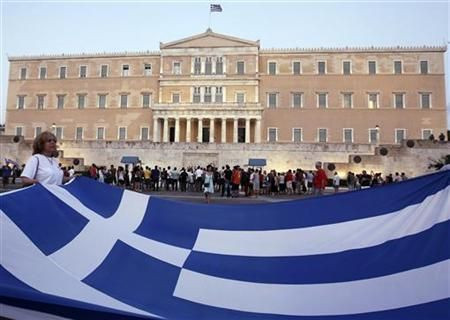Greece Likely to Receive Next Tranche of Bailout Cash in November

The embattled Greek government is likely to receive the next badly-needed tranche of bailout money from European financial officials, according to reports.
The mission has reached staff-level agreement with the [Greek] authorities on the economic and financial policies needed to bring the government's economic program back on track, said a joint statement from the European Commission (EC), the European Central Bank and the International Monetary Fund (IMF) -- the so-called ‘troika’ -- on Tuesday.
Inspectors from the troika who journeyed to Athens to examine the progress made by the government in imposing austerity measures to reduce debt will apparently deliver the next 8 billion euros ($11-billion) of cash by early November,
Of the 8 billion euro total, 5.8 billion will come from euro zone member states, with the remaining 2.2 billion from the IMF’s coffers.
There were fears that without the cash injection, the government wouldn’t be able to pay public servants and therefore default on its debt.
The success of the program continues to depend on mobilizing adequate financing from private sector involvement (PSI) and the official sector, the troika’s statement continued.
Ongoing discussions on PSI together with assurances provided by European leaders at their 21 July summit suggest that the program remains fully financed.”
The money will be forthcoming despite the fact that Greek officials themselves admitted they will fail to meet fiscal targets for 2011.
Athens forecast that its public deficit will amount to 8.5 percent of GDP in 2011 (versus the 7.4 percent figure mandated by the IMF and EU).
The troika acknowledged this scenario by noting that the fiscal target for 2011 is no longer within reach, partly because of a further drop in GDP, but also because of slippages in the implementation of some of the agreed measures.
However, the troika also said that fiscal targets for 2012 should be achieved, as long as Athens officials are committed to a determined implementation of the government's austerity plan.
Constantine Michalos, president of the Athens Chamber of Commerce and Industry, was less than thrilled with the bailout approvals.
He told BBC: We do welcome the fact that the troika is now coming forward with the proposal to advance the sixth tranche of aid in early November. However, the mixture of economic policy which is currently being applied to the Greek economy is completely in the wrong direction. It will lead to a further, and even deeper, recession in 2012.
Michael Massourakis, chief economist at Athens-based Alpha Bank, told media: It doesn't contain any surprises. Most of these things are known. But of course it is encouraging that the troika have concluded that there is reasonable hope that the agreement will get back on track.
Meanwhile, the government’s austerity plans have evoked massive outrage and fury among the Greek populace, with unions committed to lengthy strike actions. Not only is the government seeking to cut thousands of jobs, reduce spending and raise taxes, but there are plans afoot to make it easier for employers to fire even more workers.
Greek unions are calling for a general nationwide strike for October 19. Already, scads of workers, including prison guards, hospital employees, teachers, tax collectors and bank workers have threatened to walk off the job this week.
© Copyright IBTimes 2025. All rights reserved.





















